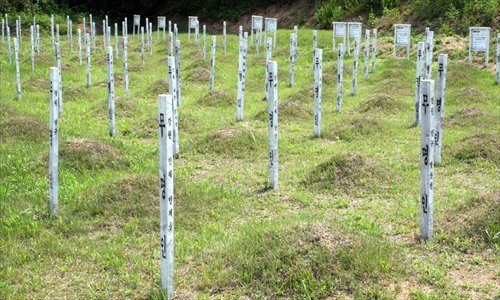Seoul to return remains of Chinese soldiers killed in Korean War

Shown is a cemetery in Paju City, Gyeonggi Province, where remains of Chinese volunteer soldiers killed in the 1950-53 Korean War are buried. Photo: CFP
South Korea will return 425 sets of remains of Chinese volunteer soldiers killed in the 1950-53 Korean War to China as soon as possible, South Korean Defense Ministry said on Thursday.
Seoul and Beijing reached an agreement earlier this month and Seoul promised to return the remains of Chinese soldiers buried at a cemetery in South Korea's border city of Paju, the ministry said.
"The military will return remains and relics of Chinese soldiers that have already been excavated to their homeland as soon as possible," the ministry said in a release.
It added that the excavation work in Paju was started earlier on Thursday and will last for several months as the soldiers' remains will be washed, dried and then placed in coffins by the South Korean side. After that, the Chinese government will take them to their home.
"The two sides agreed to return the bodies based on the agreed-upon schedule under humanitarian grounds. The agreement will become a new milestone for relations between the two nations," Yonhap news agency quoted a senior ministry official as saying.
This move came after South Korean President Park Geun-hye offered to return the remains of Chinese soldiers to China in June this year.
The Chinese People's Volunteers (CPV) were involved in the Korean War from October 25, 1950 as they tried to help North Korea resist US aggression. Tens of thousands of CPV soldiers died on the Korean Peninsula during the war.
Since 1981, a total of 403 sets of remains of Chinese soldiers have been excavated in South Korea, of which 43 have been returned so far via the United Nations Military Armistice Commission.
Xinhua